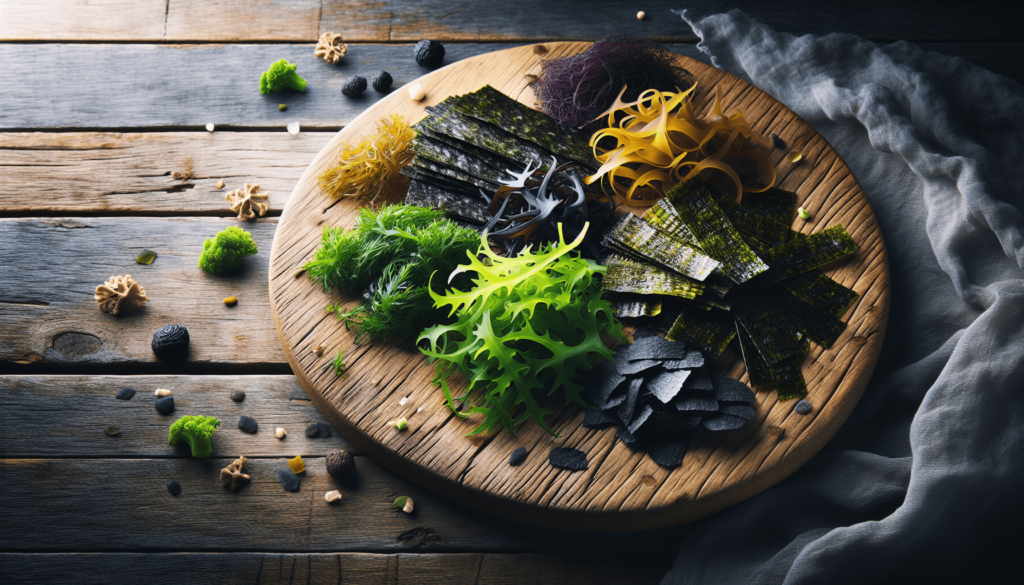Have you ever considered adding sea vegetables to your diet? These nutrient-packed underwater plants offer a wide range of health benefits and can be a delicious addition to your meals. Keep reading to discover the wonders of sea vegetables and their exceptional nutritional value.
What are Sea Vegetables?
Sea vegetables, also known as seaweeds, are edible marine algae that come in various forms and colors. They are harvested from the ocean and have been a staple in many Asian cuisines for centuries. Sea vegetables are packed with essential nutrients such as vitamins, minerals, and antioxidants that are beneficial for your overall health and well-being.
Sea Vegetables You Need to Know
Sea vegetables come in different varieties, each with its unique flavor and nutritional profile. Some popular types of sea vegetables include:
- Nori: A type of red algae commonly used to wrap sushi rolls.
- Kombu: A type of kelp that is often used to make dashi broth in Japanese cuisine.
- Dulse: A red algae with a salty flavor that can be eaten dried or fresh.
- Wakame: A brown seaweed often used in miso soup and salads.
- Kelp: A type of brown algae known for its high iodine content.
Incorporating Sea Vegetables into Your Diet
Sea vegetables can be a versatile and flavorful addition to your meals. You can use them in salads, soups, stir-fries, or even as a nutritious snack. Try experimenting with different types of sea vegetables to discover your favorite flavors and textures.
Health Benefits of Sea Vegetables
Sea vegetables offer a wide range of health benefits due to their rich nutrient content. Here are some of the key health benefits of incorporating sea vegetables into your diet:
Rich in Essential Nutrients
Sea vegetables are packed with essential nutrients such as vitamins A, C, E, and K, as well as minerals like iodine, calcium, magnesium, and iron. These nutrients are vital for maintaining healthy bodily functions and overall well-being.
Supports Thyroid Health
Iodine is a crucial mineral for thyroid function, and sea vegetables are an excellent natural source of iodine. Consuming sea vegetables regularly can help support optimal thyroid health and regulate hormone production in the body.
Promotes Digestive Health
Sea vegetables are rich in dietary fiber, which can promote healthy digestion and prevent constipation. The fiber content in sea vegetables also supports the growth of beneficial gut bacteria, which is essential for overall gut health.
Boosts Immune Function
The antioxidants found in sea vegetables help protect the body against oxidative stress and inflammation. By consuming sea vegetables regularly, you can support your immune system and reduce the risk of chronic diseases.
Supports Cardiovascular Health
Sea vegetables contain essential minerals like potassium, magnesium, and calcium, which are beneficial for cardiovascular health. These minerals help regulate blood pressure, support heart function, and reduce the risk of heart disease.

Nutritional Value of Sea Vegetables
Sea vegetables are a nutritional powerhouse, offering a wide range of vitamins, minerals, and antioxidants that are essential for overall health. Let’s explore the nutritional value of some popular sea vegetables:
Nori
| Nutrient | Amount per 100g |
|---|---|
| Calories | 35 |
| Protein | 5g |
| Carbohydrates | 2g |
| Fat | 1g |
| Vitamin A | 180mcg |
| Vitamin C | 6mg |
| Calcium | 120mg |
| Iron | 8mg |
Kombu
| Nutrient | Amount per 100g |
|---|---|
| Calories | 45 |
| Protein | 9g |
| Carbohydrates | 3g |
| Fat | 1g |
| Vitamin A | 150mcg |
| Vitamin K | 80mcg |
| Calcium | 150mg |
| Iodine | 2000mcg |
Dulse
| Nutrient | Amount per 100g |
|---|---|
| Calories | 50 |
| Protein | 6g |
| Carbohydrates | 4g |
| Fat | 1g |
| Vitamin B12 | 15mcg |
| Iron | 16mg |
| Magnesium | 200mg |
| Potassium | 600mg |
Wakame
| Nutrient | Amount per 100g |
|---|---|
| Calories | 45 |
| Protein | 7g |
| Carbohydrates | 2g |
| Fat | 1g |
| Vitamin C | 10mg |
| Magnesium | 150mg |
| Calcium | 100mg |
| Fiber | 3g |
Kelp
| Nutrient | Amount per 100g |
|---|---|
| Calories | 30 |
| Protein | 3g |
| Carbohydrates | 7g |
| Fat | 1g |
| Vitamin K | 80mcg |
| Iron | 10mg |
| Calcium | 200mg |
| Iodine | 1500mcg |
How to Select and Store Sea Vegetables
When purchasing sea vegetables, it’s essential to choose high-quality products that are fresh and free from contaminants. Here are some tips for selecting and storing sea vegetables:
Selecting Sea Vegetables
Appearance: Look for sea vegetables that are fresh, vibrant in color, and free from any mold or discoloration. Avoid sea vegetables that appear wilted or have a slimy texture.
Smell: Sea vegetables should have a mild oceanic scent. Avoid sea vegetables that have a strong fishy odor, as this may indicate spoilage.
Packaging: When buying dried sea vegetables, make sure the packaging is airtight and sealed properly to ensure freshness.
Storing Sea Vegetables
Dried Sea Vegetables: Store dried sea vegetables in an airtight container in a cool, dark place away from sunlight. Properly stored dried sea vegetables can last for several months.
Fresh Sea Vegetables: If you purchase fresh sea vegetables, store them in the refrigerator in a breathable bag or container. Consume fresh sea vegetables within a few days for the best taste and quality.

Tips for Cooking with Sea Vegetables
Cooking with sea vegetables can be a fun and delicious way to incorporate these nutrient-packed plants into your meals. Here are some tips for cooking with sea vegetables:
Rehydrate Dried Sea Vegetables
Before cooking with dried sea vegetables, it’s essential to rehydrate them properly. Soak dried sea vegetables in water for about 5-10 minutes until they become soft and pliable. You can also add a pinch of salt or vinegar to the soaking water to enhance the flavor.
Add to Soups and Stews
Sea vegetables can add depth of flavor and nutrition to soups and stews. Simply chop or tear sea vegetables into small pieces and add them to your favorite soup or stew recipe. Sea vegetables like kombu and wakame are excellent additions to miso soup and vegetable broths.
Use as a Garnish
Sprinkle dried sea vegetable flakes or strips on top of salads, rice bowls, or stir-fries to add a unique umami flavor and texture. Sea vegetables like dulse and nori can be crumbled or torn into small pieces and used as a garnish for a finishing touch.
Make Sushi Rolls
Nori sheets are commonly used to wrap sushi rolls, but you can also get creative and make sushi rolls with other types of sea vegetables like wakame or dulse. Fill your sushi rolls with your favorite vegetables, protein, and sea vegetables for a nutritious and flavorful meal.
Risks and Considerations
While sea vegetables offer numerous health benefits, there are some risks and considerations to keep in mind when incorporating them into your diet:
Iodine Sensitivity
Some people may be sensitive to high levels of iodine found in sea vegetables. If you have a preexisting thyroid condition or are sensitive to iodine, it’s essential to consult with a healthcare provider before consuming large amounts of sea vegetables.
Contaminants
Sea vegetables can absorb heavy metals and contaminants from ocean water, especially those harvested from polluted areas. It’s crucial to source sea vegetables from reputable suppliers that test for contaminants and follow proper harvesting and processing practices.
Allergic Reactions
While rare, some people may be allergic to certain types of sea vegetables. If you have a known allergy to seafood or shellfish, it’s essential to exercise caution when consuming sea vegetables and monitor for any potential allergic reactions.
Final Thoughts
Sea vegetables are a nutrient-dense and flavorful addition to any diet, offering a wide range of health benefits and culinary possibilities. By incorporating sea vegetables into your meals, you can boost your nutrient intake, support your overall health, and enjoy the unique flavors and textures of these underwater plants. So why not explore the wonders of sea vegetables and experience their exceptional nutritional value for yourself?

